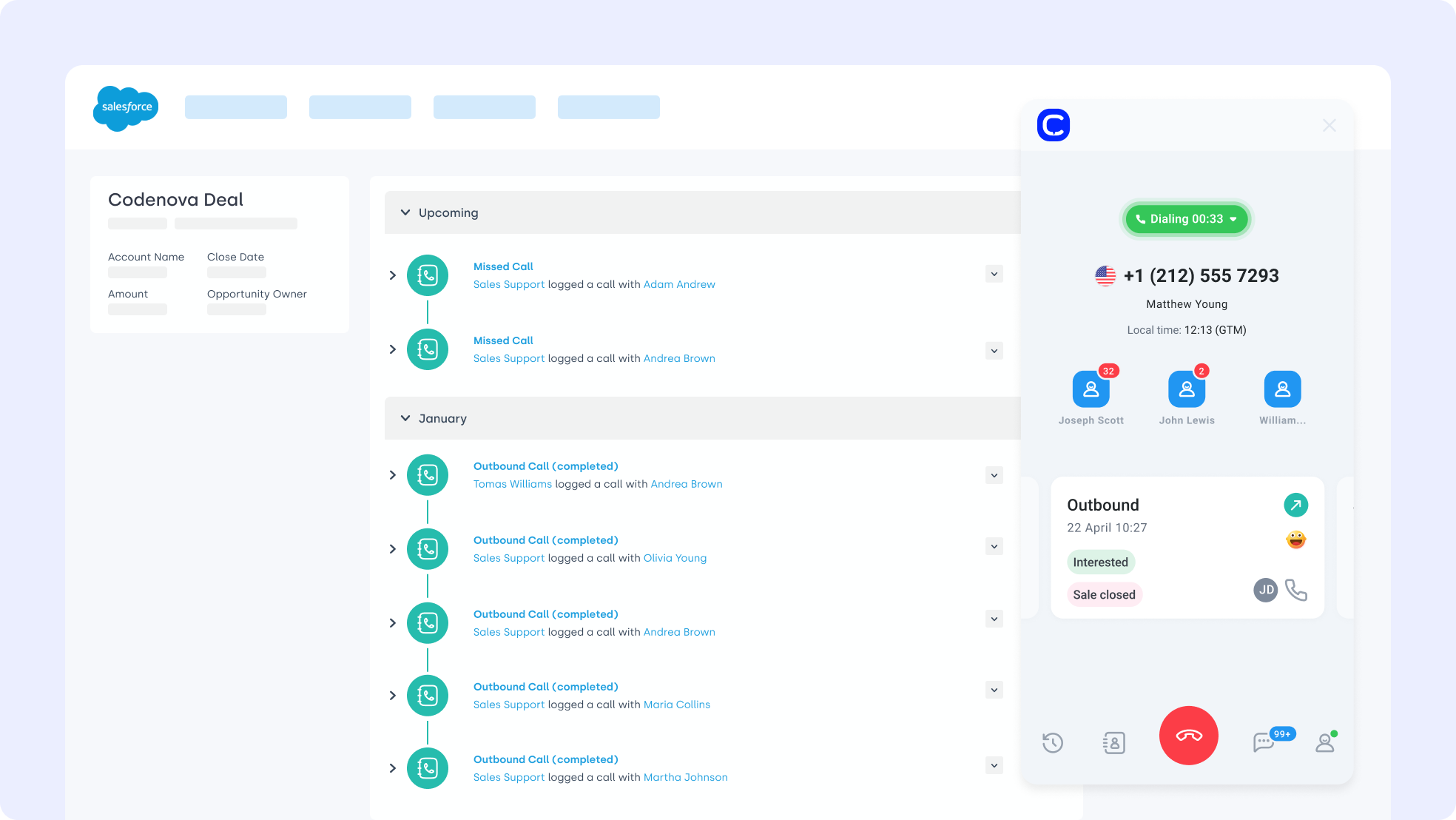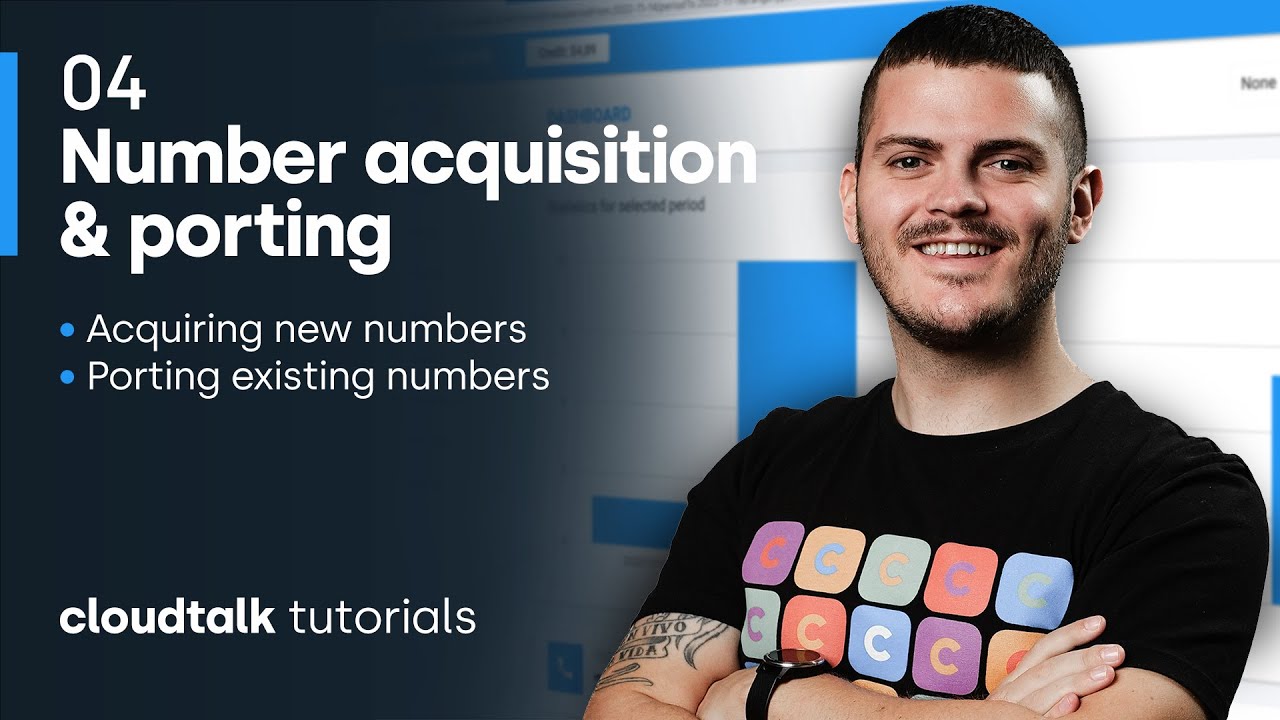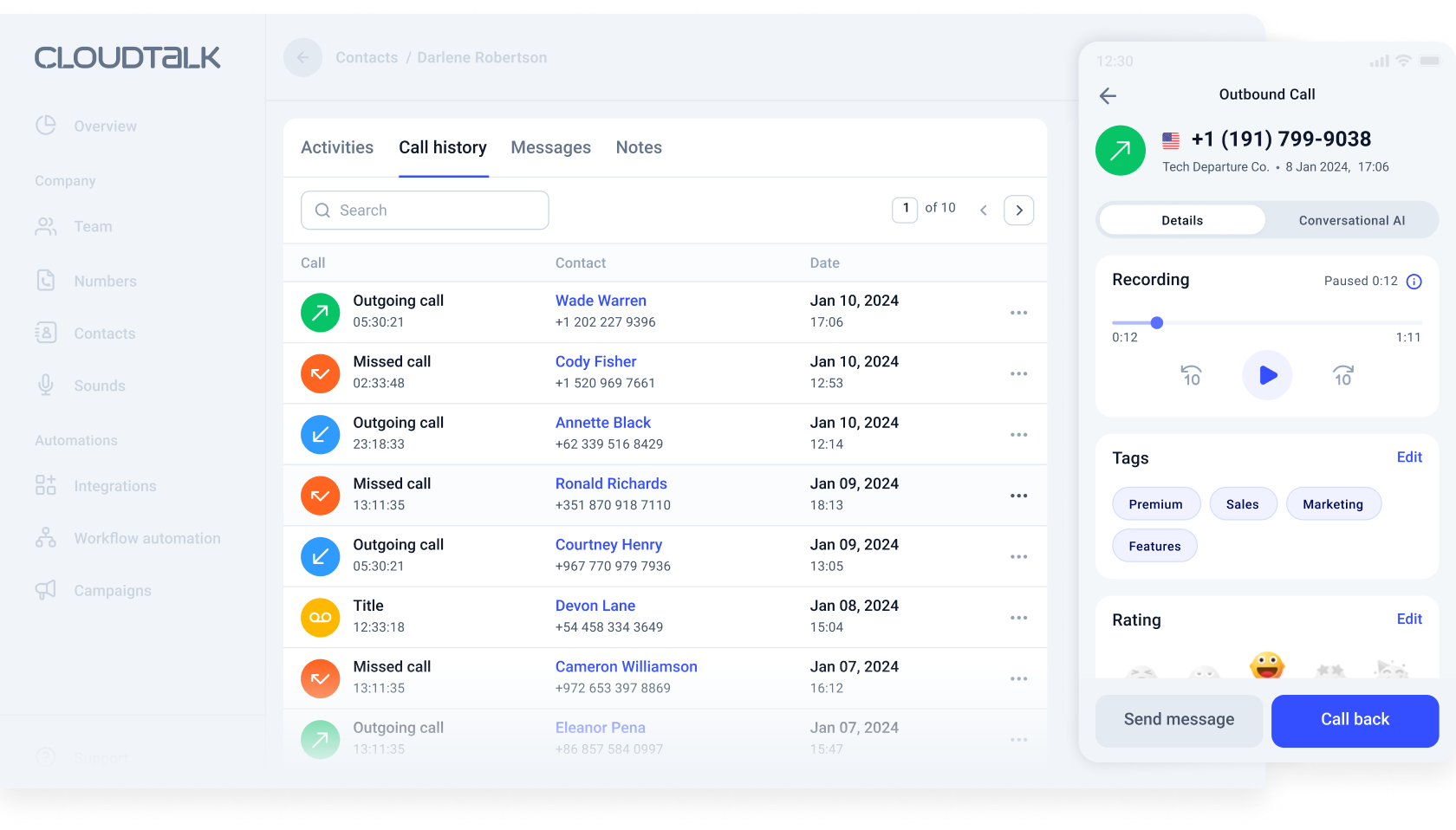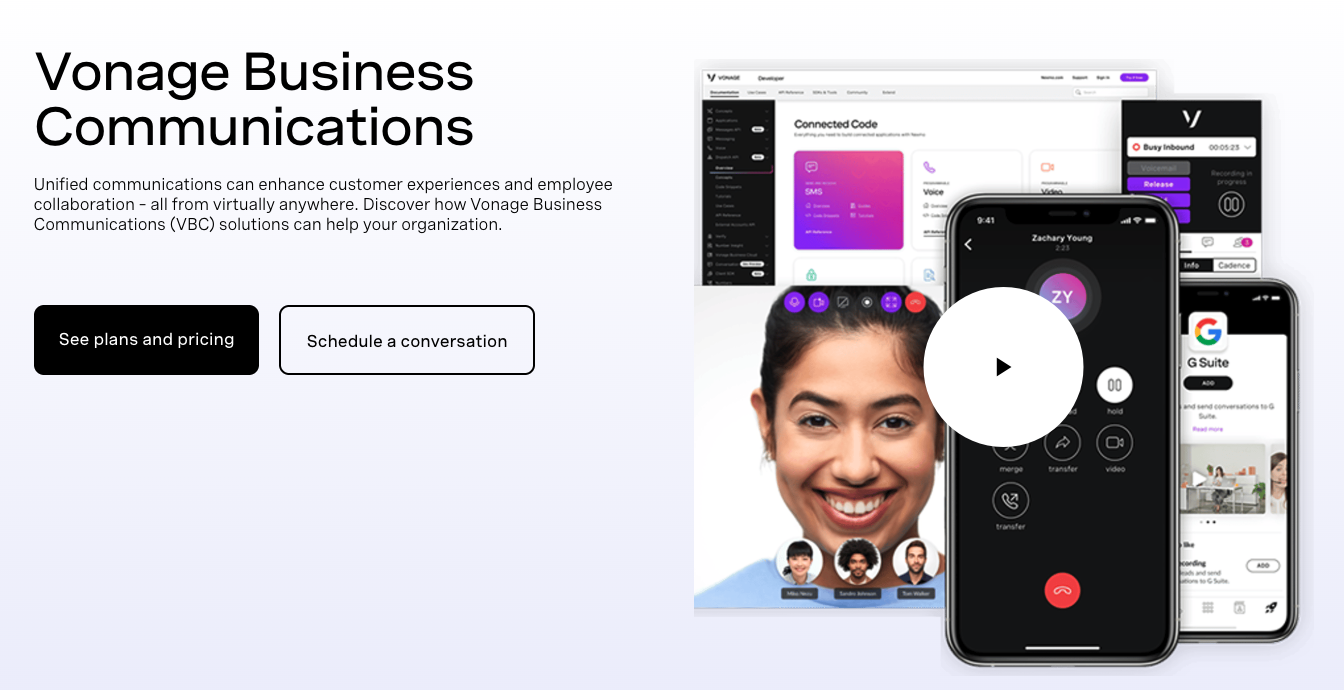The Most Honest VoIP Buying Guide for Small Business in 2026
We know. You don’t need another list of features or a pricing page riddled with fine print********. It’s almost like they’re trying to take advantage of you (and a few of them actually are).
What you need is a VoIP phone buying guide that won’t waste your time or your money. Better yet, one that shows you how to spot VoIP providers that are profit engines from those that are money pits.
This is your definitive VoIP buying guide for small businesses, designed to cut through the confusion. We’ll walk you through the key factors—from pricing and integrations to reliability and hidden gotchas—so you can make a confident decision.
TL;DR
Let’s skip the buzzwords. This VoIP buying guide for small business gives you the truth—what to look for, what to avoid, and which providers are worth your time. You’ll learn:
-
What separates reliable VoIP providers from the ones that drain your budget
-
Which factors actually impact performance (and which are just marketing noise)
-
How to choose the right platform for your team’s size, tech stack, and growth goals
By the end, you’ll know exactly how to pick a VoIP solution that won’t waste your time — or your money.
Your VoIP, Done Right
Why Trust Our Software Review?
For nearly 10 years, we’ve been helping more than 30,000 professionals with our solutions. Along the way, we’ve worked closely with experts across customer support, sales, and operations—listening to their challenges and following market trends.
To support better software decisions, we’ve reviewed over 200 software tools across industries. In the process, we’ve analyzed 5,500+ verified customer reviews from platforms like G2, Gartner, Capterra, and TrustRadius, plus real discussions on Reddit and Quora.
In the last year alone, we published over 1,000 articles—each one written by humans for humans, with care and a deep understanding of our customers’ needs. The reviews are based on trustworthy data, with one clear goal: to provide reliable insights and answers for you.
Learn how we keep our content integrity and our software review methodology.
Key Factors to Consider When Choosing a VoIP Provider for Small Business
The real question isn’t which VoIP provider has the most bells and whistles—it’s which one won’t fail you when it matters most.
Before comparing logos and price tags, you need a framework for evaluation. Let’s break down the six make-or-break factors for finding your ideal voip solutions for small business.
-
01
Budget & Pricing Structure
-
02
Integration Capabilities
-
03
Reliability, Call Quality, and Support
-
04
Spam & Deliverability of Calls
-
05
Number Porting & Local Presence
-
06
Product & Feature Fit
Budget & Pricing Structure
Here’s the truth a few VoIP providers won’t tell you: their business model relies on you not reading the fine print. They make money on your confusion.
This isn’t just a theory. Gartner studies¹ show that up to 85% of telecom and VoIP invoices contain billing errors, leading companies to overspend by 12–20% every month.
To avoid “picking these lemons”, you need to understand what’s behind the price tag and how the business VoIP pricing works:
-
Evaluate Pricing Models: Most providers offer both month-to-month flexibility and discounted annual plans. Your choice should align with your cash flow and, if you’re not completely sure, test the service monthly before committing long-term.
-
Look for Transparent Plans: Be careful with too many asterisks in the pricing plan. Choose a provider that is clear about what you get. Watch for extra fees for essential tools like IVR, call recording, or analytics that should be standard for your operations.
-
Understand the Total Cost: Account for one-time setup fees, number porting costs, and extra charges if you exceed bundled minute plans or call to destinations outside the geographic area covered by your contract.
Where CloudTalk Stands
We believe pricing should be simple, not sneaky. Whether you prefer monthly flexibility or want to lock in savings with an annual plan, CloudTalk offers straightforward pricing with no surprise fees.
CloudTalk is very straightforward and user-friendly to use. It’s a great quality service for good pricing. I love that there is a contact search. Our team likes it so far.
Integration Capabilities
If your VoIP system can’t talk to the rest of your tools, it’s holding your team hostage. A business phone should be the connector—not the bottleneck—between sales, support, and every customer interaction that matters.
-
CRM Integration Is Non-Negotiable: Seamless integration with platforms like Salesforce, HubSpot, or Pipedrive means customer information pops up automatically when they call. This eliminates manual data entry and empowers your team with context.
-
Automate Workflows: Look for providers with native integrations that let you build automated workflows, such as logging calls, sending reminders or creating new contacts after a conversation.
Where CloudTalk Stands
CloudTalk is built for connection. With 100+ native integrations, it plugs straight into your tech stack — no friction, no manual work. Every call logs itself, every record stays current, and your team always has the full picture.
Reliability, Call Quality, and Support
A cheap phone system that drops calls isn’t a deal — it’s a liability. Reliability is the foundation of trust, both with your team and your customers. When communication fails, everything else follows.
-
Uptime Guarantees: Seek providers that offer a Service Level Agreement (SLA) with at least 99.9% uptime. That’s not marketing fluff; it’s a measurable promise that your system won’t go silent when it matters most.
-
Global Infrastructure: A truly dependable VoIP provider runs on a globally distributed network of data centers. If one node falters, traffic instantly reroutes through another, keeping your lines open, your latency low, and your conversations crystal clear.
-
Responsive Support: Even the best systems hit a snag. What matters is how fast you get help. Choose a provider with a caring support team and a reputation for real, human responses—not ticket limbo.
Where CloudTalk Stands
CloudTalk’s global network spans 180+ countries with strategically placed data centers to guarantee 99.999% uptime and consistent HD call quality. And when you need help, you’re never stuck waiting. CloudTalk’s 24/7 human support team resolves issues in minutes, keeping your business moving forward.
It is the best VoIP call service that any company can count on, the calls are of very good quality, the services are very stable and the POST-sale service is the best, they are people who are always ready for any request or concern.
Spam & Deliverability of Calls
If your outbound calls get flagged as spam, it doesn’t matter how skilled your reps are; no one’s picking up. For sales, lead gen, and customer success teams, poor call deliverability can quietly wreck performance and drain ROI.
-
Carrier Reputation: Every outbound number carries a reputation score. Established VoIP providers have to maintain strong relationships with telecom carriers, which helps ensure your outgoing calls are recognized as legitimate business calls, not spam.
-
STIR/SHAKEN Compliance: This is a framework that verifies your caller ID, authenticating that each call truly originates from your company. This digital “handshake” between carriers helps legitimate calls get through and keeps your brand off spam lists.
-
Caller ID Management: Deliverability depends on maintaining clean number behavior. That means rotating numbers, managing call volume per line, and using a verified business caller ID, rather than random digits.
Where CloudTalk Stands
With smart call distribution and carrier-level trust partnerships, CloudTalk keeps your numbers clean, your pickup rates high, and your sales teams talking to real humans — not voicemail.
Number Porting & Local Presence
Your phone number is your brand’s identity. Customers save it, trust it, and call it when they need help. So when it’s time to buy a VoIP provider, the last thing you can afford is to lose it in the shuffle.
-
Number Porting: Porting shouldn’t a full-time job. A great VoIP provider makes it frictionless: they handle every step, from carrier coordination to cutover. Your team keeps calling. Your customers never notice a thing.
-
Local Presence: Customers pick up local calls; it’s that simple. With local numbers, you’re not just calling into a market, you’re entering it. A New York area code signals credibility in Manhattan. A London prefix tells clients you’re not an outsider. A local number builds connection before you even say hello.
-
International Number: Expanding internationally? You don’t need offices across continents, just virtual numbers that take your brand anywhere. Choose VoIP platforms that let you claim local or toll-free numbers in dozens of countries instantly, unifying your global reach under one easy system.
Where CloudTalk Stands
CloudTalk takes the pain out of global communication. You can move your current numbers without missing a single call and add new local lines in 180+ countries—all from one dashboard.
Product & Feature Fit
The best VoIP doesn’t just work; it fits. It slides into your workflow, making your team wonder how they ever survived without it.
-
Ease of Use: If your team needs a manual to make a call, you’ve already lost. A steep learning curve kills adoption faster than bad pricing. Look for a provider with an intuitive interface. The goal: plug in, log in, and start talking.
-
Features That Do the Job: Forget the endless lists of fluffy features with complex names no one understands. Focus on what actually drives performance and customer satisfaction, such as AI Voice Agents, Auto Dialers, Intelligent Routing, Conversation Intelligence, Analytics, and Workflow Automation
-
Scalability: Your VoIP platform should grow with you, not against you. Check if you can add or remove users, numbers, and features in seconds, without a single IT ticket.
And here’s the thing: your VoIP needs today won’t be your VoIP needs next year. The best VoIP systems evolve with technology and customer expectations.
Take AI-powered virtual agents, for example: they’re already handling up to 70% of calls without human interaction and saving companies around $5.50 per call². What sounds like a future upgrade today could be the feature you can’t live without tomorrow.
Where CloudTalk Stands
CloudTalk takes the pain out of global communication. You can move your current numbers without missing a single call and add new local lines in 180+ countries—all from one dashboard.
Comparing Top VoIP Providers for Small Businesses in 2026
Every platform claims to be “the best,” yet few actually make life easier for small teams that just want reliable, flexible communication that works.
To save you the digging, we’ve rounded up the top VoIP providers for small business. Each brings something different to the table, from simple setups to advanced automation.
Here’s who made the cut:
-
CloudTalk
-
Aircall
-
JustCall
-
RingOver
-
8×8
-
Dialpad
-
RingCentral
-
Nextiva
-
Vonage
-
Ooma
| Provider | Starting Price | Key Features | Best For |
|---|---|---|---|
| CloudTalk | $19 per user/month | Auto Dialers, AI Voice Agents, Call Monitoring, IVR, Call Flow Designer | Growing SMBs needing versatile call management |
| Aircall | $30 per user/month | Automatic Call Distribution, Call Monitoring, Call Recording, Call Routing | Small businesses focusing on daily sales and support |
| JustCall | $19 per user/month | Automatic Call Distribution, Call Recording, Call Masking, Conference Calls | SMBs requiring advanced features and reliable systems |
| RingOver | $21 per user/month | Call Recording, IVR, Call Monitoring, Analytics Dashboard | SMBs seeking an all-in-one communication platform |
| 8×8 | Not disclosed | IVR, Skills-Based Routing, Call Center Analytics, Call Monitoring | Businesses with a global customer base |
| Dialpad | $15 per user/month | AI Transcription, Google Workspace Integration, Video Conferencing Tools | Teams leveraging AI for productivity and insights |
| RingCentral | $20 per user/month | Video Conferencing, Omnichannel Communication, Customizable Analytics | Businesses unifying communication tools |
| Nextiva | $20 per user/month | Advanced Call Queues, CRM Tools, IVR Features | Businesses needing robust multi-channel solutions |
| Vonage | $13.99 per user/month | Custom API Integrations, Ring Groups, Single Sign-On | Companies with tailored communication needs |
| Ooma | $19.95 per user/month | 3-Way Calling, Virtual Receptionist, Voicemail-to-Email | Small teams with straightforward needs |
#1: CloudTalk
CloudTalk leads the way in AI-powered business calling software, purpose-built to enhance the performance of sales and customer support teams. Trusted by more than 4,000+ innovative SMBs, CloudTalk ensures crystal-clear call quality in 180+ countries, enabling teams to have meaningful, results-driven conversations.
Best for: Modern growing SMBs that want to power up their sales and support teams with smarter, scalable communication.
Pricing:
-
Lite plan: $19 per user/month billed annually, Americas only
-
Starter plan: $25 per user/month billed annually
-
Essential plan: $29 per user/month billed annually
-
Expert plan: $49 per user/month billed annually
-
Custom plan: Contact our team for a tailor-made offer
Key features:
Key integrations:
Rating:
-
Capterra: 4,4 / 5 – 267 reviews
-
G2: 4.4/5 – 1,613 reviews
| Pros | Cons |
|---|---|
| Easy to use and set up, with an intuitive interface | Onboarding coach and phone support starting from the Expert plan |
| Provides reliable support for cloud-based phone systems | There is no support for landlines and traditional PBX |
| Robust package of calling features and AI-powered tools | Lack of omnichannel capabilities (email, video conferencing, etc.) |
Why just read about it?
#2: Aircall
Aircall is a powerful calling solution built to accelerate sales processes, enhance communication with prospects, and drive deal closures. With call-handling features, CRM integrations, and Analytics, Aircall streamlines workflows and empowers teams to connect more effectively.
Best for: Primarily targeted at small businesses using the phone to conduct sales and support business daily.
-
Essential plan: $30 per user/month, billed annually
-
Professional plan: $50 per user/month, billed annually
-
Custom plan: Price-upon-request
Key features:
-
Automatic Call Distribution
-
Call Monitoring
-
Call Transfer
-
Call Recording
-
Call Routing
Key integrations:
-
ActiveCampaign
-
Freshdesk
-
Odoo CRM
-
Alloy Automation
-
Avoma
Rating:
-
Capterra: 4,3 / 5 – 427 reviews
-
G2: 4,3 / 5 – 1,144 reviews
| Pros | Cons |
|---|---|
| Plans offer comprehensive features across tiers | The starting price is higher than competitors, and advanced features through add-ons. |
| Provides a great set of call-handling features | Lacks essential video calling and webinar hosting features |
| Easy to set up and straightforward interface | Users have reported inconsistent call quality, with echoes and disconnections |
#3: JustCall
JustCall is a modern call center solution designed to help teams scale efficiently while minimizing complexities, as claimed by the provider. While feature-rich, lower-tier plans have usage caps, it is essential to evaluate your business needs carefully.
Best for: Well-suited for small and medium-sized businesses that need a reliable phone system with advanced features.
-
Essentials plan: $19 per user/month billed annually
-
Team plan: $29 per user/month billed annually
-
Pro plan: $49 per user/month billed annually
-
Business plan: Price-upon-request
Key features:
-
Automatic Call Distribution
-
Call Recording
-
Call Masking
-
Conference Calls
Key integrations:
-
Salesforce
-
Pipedrive
-
HubSpot
-
Zoho
-
Zapier
Rating:
-
Capterra: 4,2 / 5 – 212 reviews
-
G2: 4,3 / 5 – 2,055 reviews
| Pros | Cons |
|---|---|
| Real-time sentiment analysis during calls | Transcription limited to English only |
| Efficient automated call distribution | No visual call flow designer |
| Seamless CRM data synchronization | Restricted API customization options |
#4: RingOver
Ringover is a cloud-based communication platform that unifies calls, SMS, video conferencing, and more into a single interface. Designed to enhance customer interactions and boost sales efficiency.
Best for: Focused on staffing and recruitment teams seeking an all-in-one communication solution.
-
Smart plan: $21 per user/month billed annually
-
Business plan: $44 per user/month billed annually
-
Advanced plan: $54 per user/month billed annually
Key Features:
-
Call Recording
-
IVR (Interactive Voice Response)
-
Call Monitoring
-
Analytics Dashboard
Key Integrations:
-
Salesforce
-
HubSpot
-
Zendesk
-
Microsoft Teams
-
Slack
Rating:
-
G2: 4.6 out of 5 – 165 reviews
-
Capterra: 4.6 out of 5 – 509 reviews
| Pros | Cons |
|---|---|
| The Smart plan is more affordable than most other competitors | Numerous hidden fees and handy features require add-ons |
| Efficient automated call distribution | No visual call flow designer |
| Access to onboarding portal, help center access, and email and phone support | Based on review portals, customer service can be slow to respond. |
#5. 8×8
8×8 is a well-regarded communication platform with a global reach, chosen for businesses with international operations. Its scalable design ensures it can grow alongside teams of different sizes.
Best for: Businesses with a global customer base.
-
X2 plan: Not disclosed (used to be $24 per user/month)
-
X4 plan: Not disclosed (used to be $44 per user/month)
-
X6 plan: Not disclosed (used to be $85 per user/month)
-
X7 plan: Not disclosed (used to be $110 per user/month)
-
X8 plan: Not disclosed (used to be $140 per user/month)
Key Features:
-
Interactive Voice Response (IVR)
-
Skills-Based Routing
-
Call Center Analytics
-
Call Monitoring, Barging, Whispering
Integrations:
-
Salesforce
-
Zendesk
-
Microsoft Teams
Rating:
-
G2: 4.2 / 5 – 199 reviews
-
Capterra: 4.0 / 5 – 302 reviews
| Pros | Cons |
|---|---|
| Plans are comparatively affordable and well-balanced | The subscription cost quickly balloons with hidden fees |
| Intuitive and user-friendly design | The initial setup can be complex |
| Centralizes operations across calls, SMS, email, and social media | Geographic restrictions for SMS and the requirement of an office for calling capabilities |
#6. Dialpad
Dialpad is a communications platform with AI features that empower customer-facing teams. While its entry-level pricing is appealing, many handy tools are locked behind premium tiers and add-ons.
Best for: Teams focusing on leveraging AI for productivity and customer insights.
-
Standard plan: $15 per user/month billed annually
-
Pro plan: $25 per user/month billed annually
-
Enterprise plan: Tailor-made offer
Key Features:
-
AI-powered transcription
-
Analytics
-
Integration with Google Workspace and Microsoft Teams
-
Video Conferencing Tools
Integrations:
-
Salesforce
-
Miro
-
Zendesk
Rating:
-
G2: 4.4 / 5 – 1,848 reviews
-
Capterra: 4.2 / 5 – 536 reviews
| Pros | Cons |
|---|---|
| Competitive base pricing | Numerous hidden fees and essential features require add-ons |
| Excels in video conferencing and workflow integrations | Very limited in calling features and handy tools tied to higher-tier, custom-priced plans. |
| Basic analytics and reporting for all the plans | AI analytics are available only as additional plans |
#7: RingCentral
RingCentral is a comprehensive, unified communications platform offering calls, video conferencing, and team messaging. With advanced features and integrations, it’s ideal for businesses looking to unify their communication tools under one system.
Best for: Businesses looking for an all-in-one communication solution.
-
Core plan: $20 per user/month billed annually
-
Advanced plan: $35 per user/month billed annually
-
Ultra plan: $35 per user/month billed annually
Key Features:
-
Video Conferencing Tools
-
Omnichannel Communication
Key integrations:
-
Slack
Rating:
-
Capterra: 4,3 / 5 – 210 reviews
-
G2: 4,0 / 5 – 979 reviews
| Pros | Cons |
|---|---|
| Plans are comparatively affordable and offer comprehensive features | Many of the advanced features are locked behind expensive add-ons |
| Robust platform with a selection of 200+ integrations | Set up can take up to 90 days and involves an implementation fee |
| Provides business with 24/7 unlimited chat and phone support | Based on review portals, customer support is the most criticized aspect of its service |
#8: Nextiva
Nextiva is a trusted communication platform designed to keep businesses operating in-office or remotely. Renowned for its reliability and strong customer support, it serves companies seeking a robust and efficient communication system.
Best for: Businesses needing a robust and reliable phone system that works across multiple channels.
-
Digital plan: $20 per user/month billed annually
-
Core plan: $30 per user/month billed annually
-
Engage plan: $40 per user/month billed annually
-
Power Suite plan: $60 per user/month billed annually
Key Features:
-
Advanced call queues
-
CRM and team collaboration tools
-
Auto-attendant and IVR features
Integrations:
-
HubSpot
-
Salesforce
-
Zendesk
-
Zoho
Rating:
-
G2: 4.5 / 5 – 3,239 reviews
-
Capterra: 4.6 / 5 – 902 reviews
| Pros | Cons |
|---|---|
| Combines multiple channels, including social media, chatbots, and email | Many key features require upgrades. Calls and text are only available in the second-tier plan |
| The platform is intuitive and easy to navigate | Users report mobile app problems like freezing screens, slow loading times |
| Provides responsive and knowledgeable 24/7 customer service | A considerable portion of users reported long waiting times and poor customer service. |
#9: Vonage
Vonage provides a versatile communication solution that adapts to various business needs. It’s particularly valued for its flexibility, allowing businesses to tailor their system to specific requirements.
Best for: Companies with unique requirements needing tailored communication solutions.
-
Mobile plan: $13,99 per user/month billed annually
-
Premium plan: $20,99 per user/month billed annually
-
Advanced plan: $27,99 per user/month billed annually
Key Features:
-
Custom API integrations.
-
Ring Groups
-
Single sign-on functionality
Integrations:
-
HubSpot
-
Salesforce
-
Slack
-
Microsoft Teams
Rating:
-
G2: 4.3 / 5 – 465 reviews
-
Capterra: 4.1 / 5 – 309 reviews
| Pros | Cons |
|---|---|
| HD codec with adaptive bitrate optimization | Increased data usage compared to competitors |
| Competitive base pricing for different sizes of businesses | Numerous hidden fees and essential features require add-ons |
| 99.999% uptime guarantee | High resource overhead impacting system performance |
#10: Ooma
Ooma offers an affordable and accessible communication system tailored to small businesses. It has a straightforward setup and practical tools for teams looking for an easy-to-manage solution.
Best for: Small teams with no major ambitions to scale.
-
Essentials plan: $19,95 per user/month billed annually
-
Pro plan: $24,95 per user/month billed annually
-
Pro Plus plan: $29,95 per user/month billed annually
Key Features:
-
3-Way Calling
-
Virtual Receptionist
-
Voicemail-to-Email Forwarding
Integrations:
-
HubSpot
-
Salesforce
-
Zendesk
-
Zoho
Rating:
-
G2: 4.5 / 5 – 129 reviews
-
Capterra: 4.5 / 5 – 243 reviews
| Pros | Cons |
|---|---|
| 100+ communications features for small business | Requires Ooma hardware for some features |
| Competitive base pricing for different sizes of businesses | Limitations on “unlimited” calling and hidden fees |
| Easy setup process that doesn’t require advanced technical skills | Users have reported issues with call clarity and reliability. |
The Hidden VoIP Costs You Need to Watch Out For
For some VoIP providers, the advertised price is a headline, but the fine print is the full story. Don’t let your bill surprises you. Here are the five factors to watch for before you sign:
-
Setup & Activation Fees: “Free setup” doesn’t always mean free. Some providers charge hidden activation or onboarding fees once you sign the contract.
-
Promotional Price Traps: Low introductory rates can skyrocket after a short, undisclosed promo period. Always confirm how long your discount actually lasts.
-
“Unlimited” Calling Limits: Many “unlimited” plans include fair-use caps. Exceed those limits, and you could face steep per-minute overage charges.
-
International Call Surprises: Global calling plans may not cover every country or region. Frequent overseas calls can trigger unexpected international rates.
-
Number Porting Fees: Moving your existing numbers in—or out—can involve extra carrier fees. Check both your current and new provider’s policies before switching.
Bottom Line: Hidden costs can turn a great VoIP deal into an expensive mistake. A transparent provider won’t bury these details—they’ll make them clear from the start (and even write a VoIP Buying Guide to prove it).
How to Choose the Best VoIP Provider for Your Business
Searching for the ONE “best” VoIP provider is a fool’s errand. Why? Because the best provider isn’t a universal winner—it’s the one that’s perfectly tailored to your company’s unique needs and workflow.
So, instead of looking for a trophy, look for a partner. To do that, you need to focus on what truly matters. Here’s what to consider:
-
Budget: Look for a solution that aligns with your financial plan while delivering the features your business needs. Scalable pricing options are a plus, as they allow the system to grow with your company, providing long-term value.
-
Essential Features: Identify the features that will benefit your operations the most. Tools like AI Voice Agents, Dialers, Call Queuing, and Voicemail can improve how your company handles multiple calls simultaneously.
-
Scalability: Choose a system that can expand alongside your business, whether that means accommodating more employees, handling higher call volumes, or serving new locations.
-
Integration: A VoIP system that integrates smoothly with your existing tools—such as CRM platforms or help desk software—can increase productivity by making it easy to access and use customer data.
-
Ease of Use: An intuitive system is beneficial for both your team and your customers. Complicated interfaces or difficult setups can lead to inefficiencies and frustrations, so prioritize user-friendly solutions.
-
Reliability and Customer Support: Check user reviews to ensure the system is dependable and the provider offers quality support. Downtimes and technical issues can harm your business reputation.
Is CloudTalk the Right VoIP Choice for Your Small Business?
Let’s cut to the chase. You’ve seen the factors that matter. Now, the real question is: where does CloudTalk fit into your specific situation?
The answer is simple: If your business lives and dies by customer conversations over the phone, then yes, CloudTalk is the best VoIP provider for your business.
Think about what truly drives your growth. Is it making more sales calls? Providing faster support? Managing client relationships efficiently? CloudTalk was engineered specifically to be the central nervous system for sales and support teams in growing SMBs.
✅ Choose CloudTalk if:
-
Your team spends more than 2 hours a day on the phone with customers or prospects.
-
You use a CRM like Salesforce, HubSpot, or Pipedrive and hate manual data entry.
-
You need more than just a dialer—you need call analytics, AI Voice Agents, and workflows that automate your busywork.
-
Your ambition is to scale, and you need a communication platform that won’t hold you back.
❌ Maybe look elsewhere if:
-
You’re a solo entrepreneur who only needs a basic business number for occasional calls.
-
Your primary need is internal team collaboration and video meetings.
-
You have no plans to integrate your phone system with other business tools.
We’re not here to be everything to everyone. We’re here to be the absolute best at one thing: help you connect with customers over the phone and make customer experience your greatest competitive advantage.
From Research to Reality in 30 Min
Sources:



























